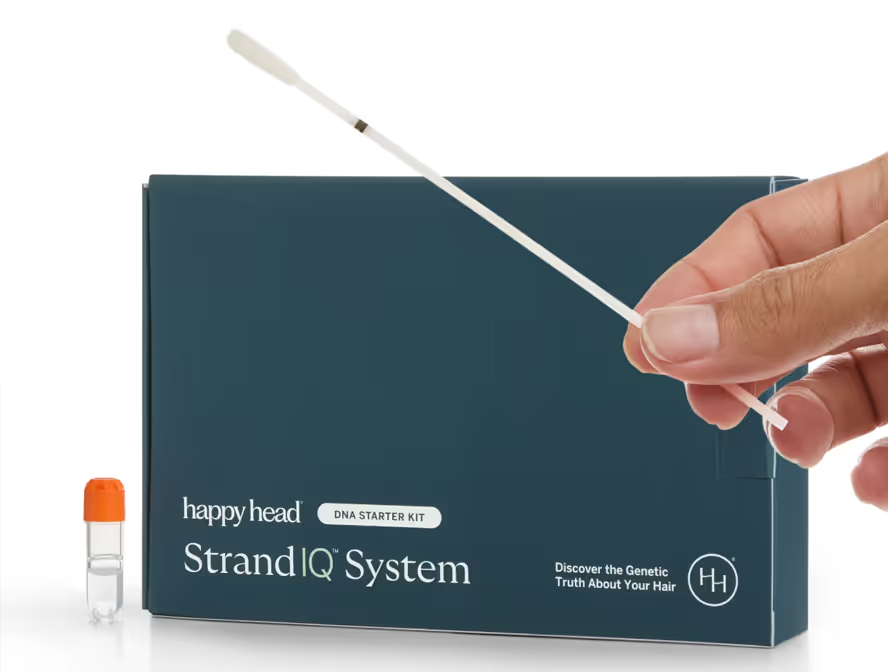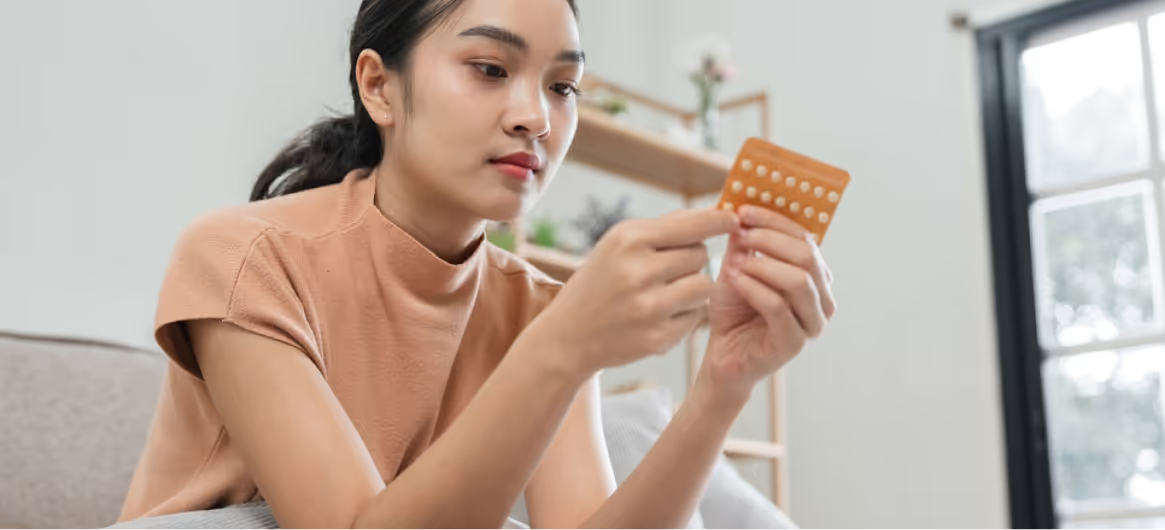Acupuncture for hair loss might not be the first thing you think about after noticing signs of hair loss, but for many, it's becoming a viable option to a frustrating problem.
With more people seeking natural, holistic approaches to wellness, this centuries-old practice is gaining newfound popularity, but does acupuncture work for hair loss? Can a few well-placed needles really fight hair loss due to genetics, stress, and autoimmune flare-ups?
In the following guide, we explore how acupuncture might just offer more than relaxation—it could be the unexpected ally your scalp has been waiting for.
What Is Acupuncture?
Acupuncture is a traditional Chinese medicine practice that involves inserting very thin needles into specific points on the body, known as acupoints. These points lie along pathways called meridians, which are believed to conduct the body’s energy.
The goal of acupuncture is to restore balance within the body by stimulating the nervous system, improving blood flow, reducing inflammation, and promoting natural healing responses.
It is commonly used to manage pain, reduce stress, support organ function, and improve overall wellness. Acupuncture is typically performed by licensed practitioners and is recognized by many modern health systems for its therapeutic benefits.
Does Acupuncture Work for Hair Loss?
Acupuncture may support hair growth by addressing underlying factors such as poor circulation, hormonal imbalances, stress, and inflammation, all of which are common contributors to hair thinning.
By stimulating specific acupoints on the scalp and body, acupuncture can enhance blood flow to hair follicles, improve nutrient delivery, and promote a healthier scalp environment.
It also helps regulate the endocrine and immune systems, which are involved in certain types of hair loss, such as alopecia areata. The precise placement of needles is believed to unblock qi and restore balance, creating an optimal environment for hair growth.
While acupuncture isn't a guaranteed cure, it can be a valuable complementary therapy, especially when combined with conventional, holistic, or prescription hair restoration strategies.
Acupuncture for Hair Growth: What’s Involved
During an acupuncture session for hair loss, a trained practitioner will carefully place needles in strategic locations on the scalp, ears, and other parts of the body. These points are believed to correspond with hair growth and overall health.
The needles are left in place for 20–30 minutes, during which time patients often experience a deep sense of relaxation.
In addition to needle placement, acupuncturists may incorporate other techniques such as scalp massage, herbal remedies, and dietary recommendations to support hair health.
Traditional Beliefs
Traditional Chinese medicine views hair loss as a sign of imbalanced qi, often attributed to factors such as stress, poor nutrition, or underlying health conditions. By stimulating specific acupuncture points, practitioners strive to restore balance and promote hair growth.
The Science Behind Acupuncture and Hair Follicles
Acupuncture may encourage hair growth by:
- Increasing blood circulation to the scalp to deliver more oxygen and nutrients to hair follicles.
- Reducing inflammation, which can contribute to hair loss.
- Regulating hormone levels, particularly androgens that contribute to hair thinning.
- Promoting the release of endorphins, which can reduce stress and support overall hair health.
While more research is needed to fully understand the mechanisms behind acupuncture for hair growth, the existing evidence is promising.
Possible Mechanisms: Blood Flow, Inflammation, and Hormones
One of the key ways acupuncture may help with hair loss is by improving blood flow to the scalp. When hair follicles receive an adequate supply of oxygen and nutrients, they are better equipped to produce healthy, strong hair.
Acupuncture's ability to reduce inflammation is also noteworthy, as chronic inflammation can contribute to hair thinning and shedding.
Additionally, acupuncture may help regulate and balance hormone levels, particularly androgens such as DHT that are associated with hair loss, to create a more favorable environment for hair growth.
As research continues to explore these mechanisms, the potential of acupuncture as a complementary hair loss treatment is becoming increasingly recognized.
What Types of Hair Loss Might Benefit From Acupuncture?
Acupuncture may be beneficial for various types of hair loss, including alopecia areata, androgenetic alopecia (male and female pattern baldness), and telogen effluvium.
While results can vary, many people find acupuncture to be a gentle, natural way to support their hair growth efforts.
Acupuncture for Alopecia Areata
Alopecia areata is an autoimmune condition that causes sudden, patchy hair loss when the immune system attacks hair follicles. Acupuncture may help by modulating immune activity, reducing inflammation, and improving blood flow to affected areas.
It can also alleviate stress, which often triggers flare-ups. Though results vary, some individuals experience hair regrowth and fewer recurrences with consistent treatment.

Acupuncture for Androgenetic Alopecia (Male and Female Pattern Baldness)
Androgenetic alopecia, also known as male or female pattern baldness, is the most common type of hair loss. It's characterized by a gradual thinning of hair, often starting at the temples or crown.
Acupuncture may help slow down hair loss and encourage regrowth by improving blood flow, reducing inflammation, and regulating hormone levels.
For effective hair regrowth, Happy Head offers prescription treatments including minoxidil, finasteride, and dutasteride, all tailored to individual needs. Combining these treatments with acupuncture may provide a comprehensive approach to managing androgenetic alopecia.

Acupuncture for Other Hair Loss Conditions
Acupuncture may also be helpful for other types of hair loss, such as telogen effluvium, which is often triggered by stress, hormonal changes, or nutritional deficiencies.
By promoting relaxation, balancing hormones, and supporting overall health, acupuncture could help reduce shedding and encourage hair regrowth.
While acupuncture shows promise for various hair loss conditions, results can vary from person to person. Consulting with a qualified acupuncturist and a dermatologist can help determine if acupuncture is a suitable option for your specific hair loss concerns.
What Does the Research Say About Acupuncture for Hair Loss?
While research on acupuncture for hair loss is limited, several studies have explored its potential benefits. These studies provide insight into how acupuncture may support hair growth and offer hope for those seeking natural solutions.
Key Studies and Clinical Trials
In one notable case study, a 34-year-old male with recurrent alopecia areata experienced significant hair regrowth after receiving a combined treatment of traditional Japanese Kampo herbal medicine, acupuncture, and pine-needle stimulation.
A thorough review of eight studies regarding the effectiveness of acupuncture for hair growth confirmed that the participants reported benefits in hair loss and growth in response to treatment with very side effects.
Limitations of Current Evidence
While studies show promise, it's important to acknowledge the limitations of current evidence.
Many studies on acupuncture for hair loss have small sample sizes and only study the effects of acupuncture when combined with other treatments, rather than the efficacy of acupuncture as a stand-alone treatment.
Also, many lack long-term follow-up or don't include placebo controls. More rigorous, large-scale clinical trials are needed to fully understand the efficacy of acupuncture for various types of hair loss.
Additionally, the quality of acupuncture treatments can vary depending on the practitioner's skill and experience. Choosing a qualified, licensed acupuncturist is essential for ensuring the best possible results and minimizing the risk of side effects.
What To Expect During an Acupuncture Session for Hair Loss
If you're considering acupuncture for hair loss, knowing what to expect during a session can help you feel more prepared and at ease. Here's a closer look at the typical treatment process and commonly targeted acupuncture points.
Typical Treatment Process
During your first visit, the acupuncturist will ask about your medical history, hair loss concerns, and overall health. They may also examine your scalp and hair to assess the extent of hair loss and identify any underlying issues.
Once the acupuncturist has gathered this information, they will develop a personalized treatment plan. This may include a recommended number of sessions, as well as any additional therapies or lifestyle changes to support hair growth.
During the actual acupuncture session, you'll lie comfortably on a treatment table. The acupuncturist will carefully insert thin, sterile needles into specific points on your scalp, ears, and other parts of your body.
Most people find the process relatively painless, with only a mild sensation of pressure or tingling.
The needles will remain in place for 20–30 minutes, during which time you can relax, meditate, or even take a brief nap. After the designated time, the acupuncturist will gently remove the needles, and you'll be free to go about your day.
Commonly Targeted Acupuncture Points
Acupuncturists may target various points on the body to promote hair growth, depending on the individual's specific needs. Some commonly targeted acupuncture points for hair loss include:
- Baihui (DU20): Located at the top of the head, this point is believed to stimulate hair growth and improve overall scalp health.
- Zusanli (ST36): Found on the lower leg, this point is thought to support immune function and promote general well-being, which may indirectly benefit hair health.
- Taichong (LR3): Situated on the foot, this point is associated with liver function and blood circulation, both of which play a role in hair growth.
- Sishencong (EX-HN1): These four points surround the Baihui point and are believed to nourish the scalp and hair follicles.
By targeting these and other points, acupuncturists aim to stimulate blood flow, reduce inflammation, and promote overall scalp health, creating an environment conducive to hair growth.
Is Acupuncture for Hair Loss Safe?
Acupuncture is generally considered a safe treatment option when performed by a qualified, licensed practitioner. However, as with any medical procedure, there are some potential side effects and risks to be aware of.
Potential Side Effects and Risks
Common side effects of acupuncture may include:
- Minor bleeding or bruising at the needle sites.
- Mild soreness or aching after the session.
- Temporary lightheadedness or dizziness.
These side effects are usually mild and short-lived, resolving within a few hours to a day after treatment.
More serious risks, such as infection or nerve damage, are rare when acupuncture is performed by a skilled practitioner using sterile, single-use needles.
It's essential to choose a reputable acupuncturist and inform them of any preexisting health conditions or medications you're taking to minimize the risk of complications.
Choosing a Qualified Practitioner
To ensure a safe and effective acupuncture experience, it's important to select a qualified, licensed practitioner. Look for an acupuncturist who:
- Has completed a comprehensive training program from an accredited school.
- Is licensed by your state's acupuncture board.
- Has experience treating hair loss and related conditions.
- Uses sterile, single-use needles and follows proper safety protocols.
- Takes the time to understand your individual needs and concerns.
Don't hesitate to ask questions about a practitioner's qualifications, experience, and treatment approach before committing to a session. A skilled, knowledgeable acupuncturist will be happy to address your concerns and help you feel comfortable with the treatment process.
Acupuncture vs. Conventional Hair Loss Treatments
Conventional hair loss treatments, such as minoxidil or finasteride, have been extensively studied and are FDA-approved for treating certain types of hair loss.
Minoxidil for hair loss promotes blood flow to the scalp, and finasteride blocks the production of DHT, a hormone that contributes to hair thinning.
While these treatments can be effective, they may come with side effects such as scalp irritation, sexual dysfunction, or unwanted hair growth in other areas. Some people may prefer the natural, noninvasive approach of acupuncture, which has a lower risk of side effects.
It's important to note that the evidence supporting acupuncture for hair loss is not as well-documented as conventional treatments. Acupuncture may be most effective when used as a complementary therapy alongside other proven hair loss solutions.
Combining Acupuncture With Other Approaches
Integrating acupuncture with other hair loss treatments may offer a more comprehensive approach to promoting hair growth. For example, combining acupuncture with minoxidil or finasteride could potentially enhance the benefits of both therapies.
Acupuncture may also be used in conjunction with lifestyle changes, such as stress reduction techniques, increasing intake of nutrient-rich food, or scalp massage, to create a holistic environment for hair growth.
By addressing multiple factors that contribute to hair loss, a combined approach may yield better results than any single treatment alone.
Ultimately, the best treatment plan for your hair loss will depend on the type and extent of hair loss, underlying health conditions, and personal preferences.
Consulting with a dermatologist or trichologist can help you determine whether acupuncture, conventional therapies, or a combination of approaches is right for you.
Who Should Consider Acupuncture for Hair Loss?
Acupuncture for hair loss may be a suitable option for a wide range of people, but it's particularly worth considering if you:
- Prefer natural, noninvasive treatments.
- Have tried conventional hair loss therapies without success.
- Experience side effects from medications like minoxidil or finasteride.
- Have a type of hair loss that may benefit from acupuncture, such as alopecia areata or telogen effluvium.
- Are looking for a complementary therapy to enhance the effects of other hair loss treatments.
- Want to address the underlying factors that contribute to hair loss, such as stress or poor circulation.
Factors To Discuss With Your Doctor
Before starting acupuncture for hair loss, it's essential to consult with your dermatologist or primary care physician to ensure it's a safe and appropriate option for you. Some factors to discuss with your doctor include:
- The type and extent of your hair loss.
- Any underlying health conditions that may be contributing to hair loss.
- Medications you're currently taking.
- Your goals and expectations for treatment.
- The potential risks and benefits of acupuncture for your specific situation.
Your doctor can help you weigh the pros and cons of acupuncture and determine whether it's a suitable addition to your hair loss treatment plan. They may also recommend other therapies or lifestyle changes to support your hair growth efforts.
Is Acupuncture for Hair Loss Worth Trying?
Acupuncture for hair loss is a promising natural treatment option that may help promote hair growth, reduce inflammation, and improve overall scalp health.
While more research is needed to fully understand its efficacy, many people find acupuncture to be a gentle, noninvasive way to support hair growth.
Combining acupuncture with other proven hair loss treatments, such as those offered by Happy Head, may provide a comprehensive approach to managing hair loss and achieving the best possible results.
If you're considering acupuncture for hair loss, be sure to consult with a qualified practitioner and your dermatologist to determine if it's a safe and suitable option for you.
Talk to a board-certified dermatologist to discuss your goals and find the solution that is best for you.
Frequently Asked Questions
Does acupuncture help regrow hair?
Acupuncture may help regrow hair by stimulating blood flow to the scalp, reducing inflammation, and addressing underlying imbalances that contribute to hair loss. While results vary, it can be a supportive therapy, especially when combined with other treatments.
How long does it take for acupuncture to work on hair loss?
Visible results from acupuncture for hair loss may take 3 to 6 months with consistent sessions, depending on the cause and severity. Some people notice reduced shedding or improved scalp health within a few weeks, but hair regrowth typically takes longer.
Does acupuncture increase follicles?
Acupuncture does not create new hair follicles, but it may improve the health of existing ones. By enhancing circulation and reducing inflammation, it can reactivate dormant follicles and extend the growth phase, supporting fuller, healthier hair over time.
Does acupuncture thicken hair?
Acupuncture may help thicken hair by stimulating nutrient-rich blood flow to the scalp and reducing stress-related hair loss. Over time, it can improve hair texture and density, especially when used alongside lifestyle changes and other proven treatments.












